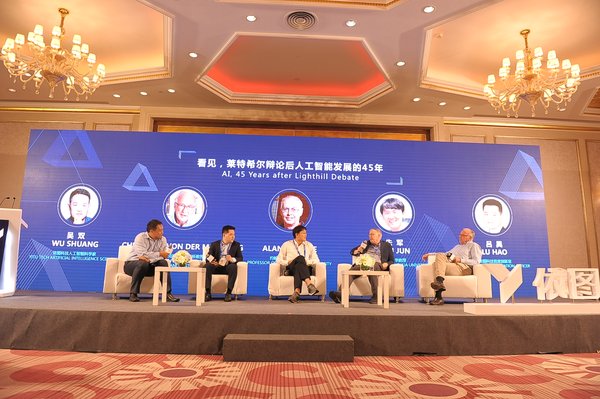SHANGHAI, Sept. 19, 2018 /PRNewswire/ -- YITU held a forum themed "A vision for the AI future -- Where wisdom and expertise meet" at World Artificial Intelligence Conference 2018 (WAIC) with all the heavyweights in the AI industry sharing inspiring talks and views on AI development in Shanghai.

The insights were about aspects of AI including recent advances and trends of AI, autonomous intelligence, the limitations of AI, the influence of AI on biology, medicine and the pharmaceutical industry, following a roundtable among the great minds reflecting on the famous debate 45 years ago -- Lighthill Debate.
The academic experts attended the forum including Professor Alan L. Yuille, protégé of Stephen Hawking in theoretical physics of Cambridge; Professor Christoph Von Der Malsburg of Southern California University; Professor Pieter Abbeel of UC Berkeley; Dr. Zhu Jun of Tsinghua University; and Dr. Ma Jian of Carnegie Mellon University. YITU's Chief Innovation Officer Lu Hao and AI scientist Wu Shuang also joined in the forum with the insights from the front line of the industry.
Dr. Lu Hao pointed out: "The challenge on facial recognition is about the scale although increasing number of organizations or individuals are working on facial recognition technology." YITU made a great effort to be able to identify faces of multiple races.
Professor Pieter Abbeel displayed plenty of cases that machines can keep learning from their failures getting increasingly close to a goal previously set by humans. He disagreed with the idea about the "third winter of AI is coming" theory as he believes the development of AI will not encounter the bottleneck as human beings have much more intelligence to explore.
Meanwhile, Professor Alan l. Yuille brought his cautious views on what AI can do and its limitations. As an expert familiar in both brain science and machine intelligence, he said developing AI systems with human-like capabilities will take time, which requires better understanding of human intelligence, AI, cognitive science and neuroscience. "AI will soon take over from humans are science fiction," he said.
In Professor Christoph Von Der Malsburg's opinion, he believes the current AI just reflects the human's mind. "For the further development of AI, we need to have more revolutionary innovation and changes," he said.
Dr. Ma Jian and Dr. Fan Jie also shared their works and views on how AI is being utilized in medicine and biology during the event.
The forum also rekindled a panel discussion about the Lighthill Debate. 45 years ago, the debate brought the winter to the development of AI while now AI is the hottest topic in China. It's valuable to reflect on those AI question at this very period of time.
At the forum, YITU also proudly announced a strategic cooperation with UNIDO ITPO Shanghai (Investment and Technology Promotion Office of the United Nations Industrial Development Organization) for promoting the development of developing countries with the help of AI technology.
The cooperation will be brewed in several aspects including platforms, industries, experts and technology. It reckons YITU's experience and potential capability in the industry in a bigger picture as well as a promising opportunity for YITU to expand overseas on the aspects of intelligent healthcare, public safety, financial services and smart cities.
As a Chinese AI startup, YITU has its in-depth academic understanding in AI and is devoted to taking advantage of it to apply to business applications. It aims to become the leader in the industry in China. YITU just won the Super AI Leader award (SAIL Award) among over 500 nominated companies and organizations around the globe during this event at World Artificial Intelligence Conference (WAIC).
About YITU Technology
YITU Technology (YITU) is a pioneer in practical artificial intelligence (AI) research and innovation that provides advanced AI-based business solutions to build a safer, better and healthier world. YITU owns a world-class R&D team that drives industrial development to find comprehensive solutions in the areas of machine vision, speech and language understanding.